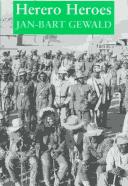| Listing 1 - 4 of 4 |
Sort by
|
Book
ISBN: 389645269X Year: 2002 Publisher: Köln Köppe
Abstract | Keywords | Export | Availability | Bookmark
 Loading...
Loading...Choose an application
- Reference Manager
- EndNote
- RefWorks (Direct export to RefWorks)
Herero (African people) --- Oral tradition --- Tradition, Oral --- Oral communication --- Folklore --- Oral history --- Hereros --- Herrero (African people) --- Ochiherero (African people) --- Ovaherero (African people) --- Bantu-speaking peoples --- Ethnology --- Damara (African people) --- Social life and customs. --- Rites and ceremonies. --- Rites and ceremonies --- Social life and customs

ISBN: 0821412574 0821412566 0852557493 085255754X 086486387X Year: 1999 Publisher: Athens Ohio University Press
Abstract | Keywords | Export | Availability | Bookmark
 Loading...
Loading...Choose an application
- Reference Manager
- EndNote
- RefWorks (Direct export to RefWorks)
Herero (African people) --- Biography. --- History. --- Hereros --- Herrero (African people) --- Ochiherero (African people) --- Ovaherero (African people) --- Bantu-speaking peoples --- Ethnology --- Damara (African people) --- Biography --- History --- Namibia --- GRN (Namibia) --- Namibii︠a︡ --- Namibië --- SWA/Namibia --- SWA/Namibië --- S.W.A./Namibia --- Republic of Namibia --- Namibia ye Likuluhile --- South-West Africa
Book
ISBN: 9781452034942 145203494X Year: 2011 Publisher: Bloomington AuthorHouse
Abstract | Keywords | Export | Availability | Bookmark
 Loading...
Loading...Choose an application
- Reference Manager
- EndNote
- RefWorks (Direct export to RefWorks)
"The Otjiherero-English dictionary is a working dictionary of contemporary Otjiherero-English words you are likely to read, write or hear in daily interactions. In this reference, you will find essential information about grammar usage, basic phrases, conversion tables, holidays, historical events of the Otjiherero-speaking people, etc. It was written to be a translator reference source for travelers, students, and and others; with the goal of improving communication between the Otjiherero and English languages, as well as introducing the culture of the Otjiherero-speaking people of Namimbia"--P. 4 of cover.
Herero language --- English language --- Herero (African people) --- #SBIB:39A1 --- #SBIB:03H2 --- Hereros --- Herrero (African people) --- Ochiherero (African people) --- Ovaherero (African people) --- Bantu-speaking peoples --- Ethnology --- Damara (African people) --- Damara language (Bantu) --- Ociherero language --- Otjiherero language --- Otyiherero language --- Bantu languages --- Germanic languages --- English --- Herero --- Grammar --- Social life and customs --- Antropologie: algemeen --- Woordenboeken --- English language. --- Herero language. --- Grammar. --- Social life and customs.
Book
ISBN: 0814343864 0814343856 Year: 2017 Publisher: Detroit, Michigan : Wayne State Uiversity Press,
Abstract | Keywords | Export | Availability | Bookmark
 Loading...
Loading...Choose an application
- Reference Manager
- EndNote
- RefWorks (Direct export to RefWorks)
The first genocide of the twentieth century, though not well known, was committed by Germans between 1904-1907 in the country we know today as Namibia, where they exterminated hundreds of Herero and Nama people and subjected the surviving indigenous men, women, and children to forced labor. The perception of Africans as subhuman "lacking any kind of civilization, history, or meaningful religion" and the resulting justification for the violence against them is what author Elizabeth R. Baer refers to as the "genocidal gaze" an attitude that was later perpetuated by the Nazis. In The Genocidal Gaze: From German Southwest Africa to the Third Reich, Baer uses the metaphor of the gaze to trace linkages between the genocide of the Herero and Nama and that of the victims of the Holocaust. Significantly, Baer also considers the African gaze of resistance returned by the indigenous people and their leaders upon the German imperialists.
Genocide in literature --- Genocide --- Holocaust, Jewish (1939-1945), in literature --- Postcolonialism in literature --- History and criticism. --- Germany --- Colonies --- Cleansing, Ethnic --- Ethnic cleansing --- Ethnic purification --- Ethnocide --- Purification, Ethnic --- Crime --- Herero (African people) --- Nama (African people) --- Witbooi, Hendrik, --- Namibia --- History --- German Studies --- Jewish Studies --- Herero people --- Nama people --- Morenga (film) --- Namakwa (African people) --- Naman (African people) --- Namaqua (African people) --- Rooi Nasie (African people) --- Ethnology --- Khoikhoi (African people) --- Hereros --- Herrero (African people) --- Ochiherero (African people) --- Ovaherero (African people) --- Bantu-speaking peoples --- Damara (African people) --- Namibia ye Likuluhile --- Namibi --- Namibii͡ --- Republic of Namibia --- S.W.A./Namibia --- South-West Africa --- SWA/Namibia --- SWA/Namibi
| Listing 1 - 4 of 4 |
Sort by
|

 Search
Search Feedback
Feedback About UniCat
About UniCat  Help
Help News
News